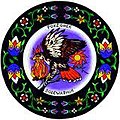Pokagon Band of Potawatomi Indians
|
|
|
| Total population | |
|---|---|
| (5,000 +) | |
| Regions with significant populations | |
| Michigan & Indiana | |
| Languages | |
| English, Potawatomi | |
| Religion | |
| Christianity Roman Catholic, traditional tribal religion |
Pokagon Band of Potawatomi Indians are a federally recognized Potawatomi-speaking tribe based in southwestern Michigan and northeastern Indiana. Tribal government functions are located in Dowagiac, Michigan. The tribal membership was approximately 4,990 members as of 2014. They occupy reservation lands in a total of ten counties in the area.
The Potawatomi originated as a people along the Atlantic coastline at the mouth of the St. Lawrence River. Over centuries, along with the Ojibwe and Odawa Anishinaabe peoples, they migrated west to the Great Lakes region some 500–800 years ago in a "Great Migration."
The Pokagon are descendants of the residents of allied Potawatomi villages that were historically located along the St. Joseph, Paw Paw and Kalamazoo rivers in what are now southwest Michigan and northern Indiana. They were the only Potawatomi band to gain permission from the United States government to remain in Michigan after Indian removal in the 1830s. Many of the cities and streets in the Michigan area have adopted Potawatomi names. The tribe has been federally recognized since 1994 legislation affirmed its status; it has established self-government.
The Pokagon Band of Potawatomi Indians were party to 11 treaties with the federal government, with the major land cession being under the 1833 Treaty of Chicago. During the Indian removals, many Potawatomi bands were moved west. But, Chief Leopold Pokagon negotiated to keep his Potawatomi band of 280 people in southwestern Michigan. They were the only Potawatomi band who did not remove west of the Mississippi River.
...
Wikipedia

